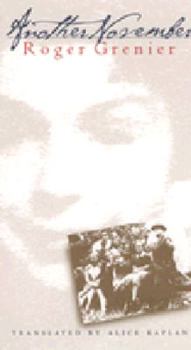Another November
French writer Roger Grenier's stunning novel tells of a group of friends in the southwest of France whose lives are forever changed by the German Occupation. The moral failings of one of them, Charles Merlin, which at first seem trivial and personal, assume more sinister dimensions when he collaborates with the Nazis. The narrator of the novel, a member of the resistance, watches Charles's decline and gains a poignant education in his own failings as he tries to rescue the women in Charles's life.
Format:Paperback
Language:English
ISBN:0803270720
ISBN13:9780803270725
Release Date:January 1998
Publisher:Bison Books
Length:86 Pages
Weight:0.30 lbs.
Dimensions:0.4" x 4.8" x 8.3"
Customer Reviews
2 ratings
Overlooked little gem
Published by Thriftbooks.com User , 17 years ago
This novella has many things going for it. The author's sense of melancholy is superb and his spare, uncluttered writing wastes no space. Yet, while his simple, clean language moves you forward quickly, it leaves you holding souvenirs of every character you meet. And then there are the witty one-liners, such as this one about the change from times of affluence and ennui to austerity ("The good times when we wanted to die were already over.") The only downside to the piece is an aloof style that (reminiscent of Vidal's The Golden Age) keeps you from getting too close to anyone. It isn't haughtiness, just self-protection, but still.
A powerful memory of childhood during wartime
Published by Thriftbooks.com User , 26 years ago
Another November seems like it might be short and simple. But its unembellished prose carefully and powerfully conjures up images and memories of a troubled history. It is a serious story narrated by a man looking back on his childhood and young adulthood in a small town in southwestern France, and reflecting on the indelible mark left by the German Occupation on young lives. The author masterfully captures the complexity of political reality intersecting with childhood friendships and relationships -- political reality that includes class differences at first and extends to the clash between collaborators and the resistance, signaling the end of childhood. Though the narrator's style, on one level, seemed to keep me at a distance from the characters, seemingly uninvested in their personal struggles, ultimately I was left haunted by them and their choices and by the unsettling combination of normal everyday-ness and profound evil of the Occupation. Grenier makes us feel the way the war would change things forever; yet, he reminds us how some things remained business-as-usual. Eschewing detailed descriptions, he makes us feel the characters' pain and sense the reality of the war. The book is so effective and rewarding, I think, because of the sparse tone and careful turns-of-phrase that stayed with me even after I finished reading, and because of the subtlety of its cues as to what it meant to resist and what it meant to collaborate. It refuses to speak of the war in grandiose, familiar ways; instead, it focuses delicately on its effect on people who were neither its overt victims nor its villains. It makes the reader ponder the ambiguity between how the war changed the life of this small town forever and how life seemd to go on as before. It is a rich memoir of childhood and of war, where much of what was so disturbing about the period remains below the surface for the reader to uncover.






